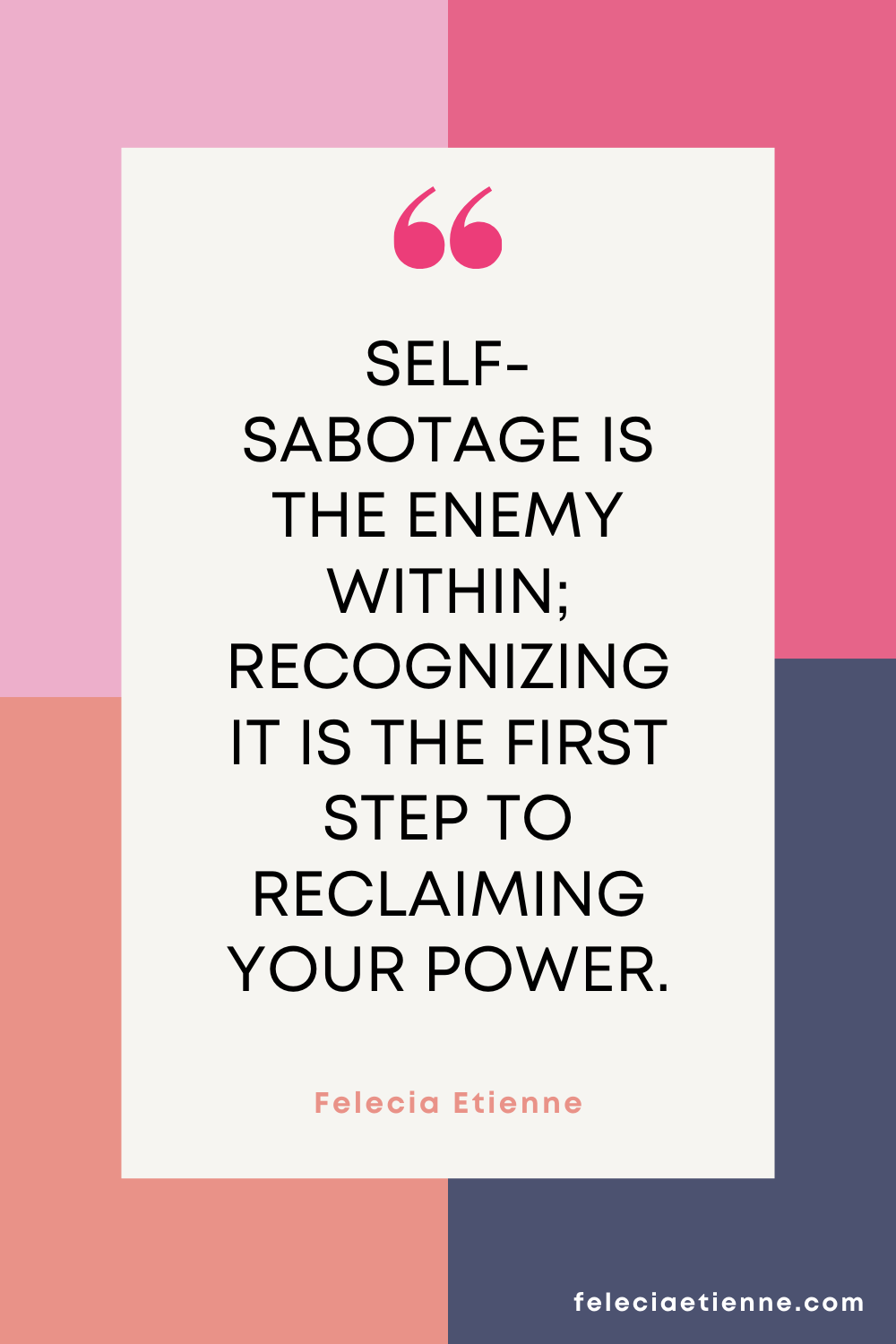Mastering Your Power: Essential Strategies for High-Achievers to Beat Self-Sabotage
Mastering Your Power: Essential Strategies for High-Achievers to Beat Self-Sabotage
Feeling like you're running on a treadmill in your own life? Working tirelessly, planning everything to the T, yet stuck in a never-ending loop of setbacks and disappointments? You're not the only one riding this frustrating rollercoaster. Despite your smarts, loving family, and successful career or business, does happiness seem just out of reach, leaving your days blending into a grey monotony?
You might think it's just you against the world, caught in a cycle of self-sabotage. I've been in that exact spot, feeling lost in a sea of powerlessness for months. But here's the breakthrough - it wasn't my fault, and it's not yours either. Our brains are primed more for survival than for thriving, which means we're often our own biggest obstacles without even realizing it.
The good news? It's possible to break free from this pattern, and I'm here to show you how. Let's understand why we sabotage ourselves and discover practical, effective strategies to flip the script on our survivalist brains. Ready to transform your life into one of purpose, fulfillment, and success? It starts with a shift in perspective.
What is self-sabotage, and how does it affect us?
Understanding Self-Sabotage: The Battle Within
“To overcome self-sabotage, listen to your fears but let your courage have the final say.”
First things first – let's talk about self-sabotage. It's what happens when you're on the edge of success or happiness, and somehow, you end up putting obstacles in your own way. Whether it's procrastinating, doubting yourself, fearing failure, or even success, these behaviors and thought patterns keep you from reaching your full potential. Sometimes, it shows up in sneaky ways, like aiming for perfection or straining your relationships without realizing why. Often, it's your deep-seated fears and insecurities that are at play, hiding just beneath the surface.
The Root Causes of Self-Sabotage
“Self-sabotage is the enemy of progress. Recognize it, confront it, and you’ll conquer your highest peaks.”
So why do we self-sabotage? It all boils down to our biology and psychology, intertwined with your deep-seated beliefs and fears. These often stem from past experiences and traumas that have shaped your self-esteem and confidence. As humans, we are wired for survival, with our brain constantly scanning for potential threats. This instinct can lead to fear-based behaviors and thought patterns that prevent you from taking risks and stepping outside of your comfort zones. It's a clear manifestation of the psychological and emotional factors at play in your life.
The Psychological Roots of Self-Sabotage
“Your mind is a powerful tool; use it to build and not destroy.”
Understanding the roots of your self-sabotage is crucial. It's not just about dealing with your fear of the unknown; it's also about coming to terms with the deep-rooted beliefs you've accumulated throughout your life. These beliefs stem from society, your past experiences, and even offhand comments from others, profoundly shaping your perspective. For instance, being told as a child that you weren't smart enough or capable enough can have a lasting impact on you.
RELATED ARTICLE: 5 Common Symptoms of Self-Sabotage and Ways to Stop the Cycle
The Impact of Negative Beliefs on Behavior
“The greatest weapon against self-sabotage is a deep understanding of one’s own thoughts and actions.”
These beliefs linger, causing you to doubt yourself and engage in self-sabotage, behaviors that prevent you from achieving success or happiness. Recognizing and addressing these underlying issues is key to overcoming self-sabotage, allowing you to move forward with confidence.
The Impact of Trauma on Self-Sabotage
“Your past may have shaped you, but it doesn’t define you.”
Understanding the role of traumatic events in self-sabotage is crucial for personal growth. These experiences, whether significant or an accumulation of smaller ones like childhood neglect, bullying, or toxic relationships, can deeply affect our confidence and self-view. These scars shape your fears and insecurities, manifesting in behaviors that undermine your success and hinder your progress.
However, there is hope. Recognizing these patterns is the first step toward transformation. By confronting your past and working through your fears and insecurities, you can break free from these chains and embrace your true potential. It's not an easy journey, but it's possible with the right support and guidance. Imagine a life where you feel deserving of success and are no longer held back by the echo of past traumas.
Dealing With the Effects of Self-Sabotage
“The only thing standing between you and success is your own mind.”
Identifying Your Triggers and Patterns of Self-Sabotage
“It takes courage to identify self-sabotaging behavior, but it takes strength to overcome it.”
Self-sabotage can wreak havoc, from nagging inconveniences to major roadblocks, disrupting both our personal and professional journeys. It often spirals into feelings of inadequacy, plummeting self-esteem, and a frustrating sense of being trapped in life.
RELATED ARTICLE: The Top 11 Ways Leaders Unknowingly Self-Sabotage and What to Do About It
Understanding the Impact of Self-Sabotage on Our Well-Being
“Self-sabotage is a prison of the mind, but you hold the key to unlock it.”
This behavior doesn't just chip away at your mental and emotional health; it also throws a wrench in your relationships and career paths, trapping you in a vicious cycle of setbacks and disappointment. In the worst cases, it can spiral into depression, anxiety disorders, or even affect your physical health, deepening the rut of self-doubt and blocking your path to progress and success. But here's the deal: self-sabotage isn't a life sentence. With the right strategies, you can break free and turn things around.
Overcoming Self-Sabotage:
“Self-sabotage is your greatest challenge, but it can also be your greatest teacher.”
So, how do you conquer self-sabotage and seize control of your destiny? Here's the exciting part: you can actually reprogram your brain to ditch those self-defeating behaviors and pave the way for success and satisfaction. Yes, it requires effort, patience, and a readiness to tackle the deep-seated issues fueling your self-sabotage, but the payoff is absolutely worth it! Before we head over there, let's clear up some of the signs, okay?
Achievers' Reflection Point:
“The only road to success is through self-awareness.”
Self-sabotage is sneaky. It presents itself in different ways, and sometimes, we don't even realize it's happening until after the damage has been done. That's why constant self-reflection and awareness are crucial. Set time aside regularly to reflect on your thoughts, actions, and patterns. Ask yourself if you're holding yourself back in any way, and be honest with yourself.
Signs of self-sabotaging behavior:
Self-sabotage can be difficult to recognize at first because it's often ingrained in our thoughts and actions. However, by being aware of your behavior and patterns, you can start to identify and interrupt these self-sabotaging habits.
“Self-sabotage is like standing in front of a locked door, but the key was inside your pocket all along.”
Some common signs of self-sabotage include:
Negative self-talk:
Continually doubting your abilities and potential, constantly undermining yourself with pessimistic thoughts.
The fear of failure:
It's that daunting shadow holding you back from taking risks or diving into new experiences, all because the thought of failing seems too much to bear.
Perfectionism:
Chasing impossible standards and battling feelings of failure when you fall short.
Procrastination:
Putting off important tasks or goals until the last minute or not taking action at all.
Self-medicating:
Using drugs, alcohol, or other harmful habits to cope with negative emotions.
People-pleasing:
It's that endless quest for others' validation and approval, often sacrificing your own well-being in the process.
Imposter Syndrome:
That nagging feeling you're just faking it and somehow don't truly deserve your hard-earned successes.
Playing the victim role:
Pointing fingers at outside circumstances for your setbacks rather than owning up to your part in them.
Self-isolation:
Withdrawing from social situations and isolating yourself due to fear or insecurity.
Self-criticism:
Being overly critical and harsh towards yourself, leading to feelings of worthlessness.
Avoiding challenges:
Not pushing yourself out of your comfort zone and avoiding opportunities for growth.
Lack of self-care:
Neglecting your physical and emotional needs, leading to burnout and exhaustion.
Constant comparison:
Measuring yourself against others, leading to feeling like you're not good enough or even a bit jealous.
All-or-nothing thinking:
Believing that if you can't do something perfectly, then it's not worth doing at all.
Control issues:
Trying to control everything in your life instead of going with the flow.
Self-doubt:
Second-guessing yourself and your decisions, leading to indecisiveness and lack of action.
Turning down help:
Refusing to seek support or guidance from others, believing that you have to do everything on your own.
Achievers' Reflection Point:
Take a moment to reflect on these signs and think about which ones resonate with you. How have they shown up in your life? Which ones do you want to work on overcoming?
Strategies for Overcoming Self-Sabotage and Mastering Your Power
“Self-sabotage is the enemy within; recognizing it is the first step to reclaiming your power.”
Realizing you've been engaging in self-sabotaging behavior can feel daunting and overwhelming. It's natural to feel powerless or even despair when confronted with your own destructive patterns. But remember, spotting these patterns is key to getting your life back on track. Overcoming self-sabotage requires addressing both the underlying causes and implementing practical strategies to change our mindset and behavior. By acknowledging your self-sabotage patterns and actively working towards change, you can shift power back into your hands and create a more positive and fulfilling life for yourself.
Achievers' Reflection Point:
Reflect on how taking full responsibility for your actions and behaviors has shaped your journey. What shifts have you noticed?
Exploring new perspectives can be a powerful tool against self-sabotage. How might changing your viewpoint unleash your potential?
Assess your belief in your capacity to drive positive change in your life. What supports this belief, or what doubts do you have?
Taking Responsibility for Your Actions and Behaviors
Shifting the power back into your hands starts with owning up to your actions and behaviors. This journey begins with acknowledging how self-sabotage has affected you and those around you and being ready to take responsibility. It's crucial to realize that you can change your thoughts, beliefs, and actions, no matter how long they've been a part of you.
RELATED ARTICLE: 3 Mindset Shifts That Skyrocket Your Success
The Power of Perspective
I want to share something that's really changed how I see things: realizing you're not stuck because of your past or what's happening around you, but that you have the power to shape your future is so empowering. This feeling of being in control is all about taking responsibility for your life, something that's also talked about a lot in psychology. It reminds me of this theory by Julian B. Rotter about locus of control, which basically says that feeling in charge of our actions makes us more willing to embrace change and take control of our lives.
The Role of Self-Efficacy in Change
Taking charge of our actions can really power up our ability to make a difference. Think about it like this: the more you believe in your power to push through challenges and achieve your goals (a big shoutout to Albert Bandura for this game-changing idea of 'self-efficacy'), the more driven and resilient you become. It's not always easy to face the tough truth that sometimes we're part of the problem, but recognizing this is a key step towards growth. Imagine how empowering it feels to know that by stepping up, you're not just going through the motions—you're actually steering your life in the direction you want it to go. That's the magic of believing in yourself and your ability to change things for the better.
Reinventing Your Story: Embracing Change and Building Resilience
Embracing Vulnerability and Letting Go of Perfectionism
Actually, showing your vulnerable side is a sign of strength, not a weakness at all. I've learned that overcoming self-sabotage requires the immense courage to let go of perfectionism and embrace your authentic self, flaws, and all. Real ownership extends beyond admitting past mistakes; it's about transforming your story into one of empowerment, resilience, and victory. Changing our mindset is crucial, but the real shift happens when you take concrete steps to stop beating yourself up, paving the way for a significant change. Once you do, breaking free from self-sabotaging behaviors becomes much easier, allowing us to embrace change and grow.
“Vulnerability is the birthplace of innovation, creativity, and change.”
This quote inspires us to see vulnerability as the foundation of our strength and the catalyst for our growth and transformation.
Setting Goals and Taking Action
This change means setting ambitious goals you can actually reach, breaking tasks down into smaller bits, getting advice from people you trust or professionals, making time for self-care, being kinder to yourself, and being brave enough to take small risks to push your boundaries.
Overcoming Setbacks and Embracing Growth
It's crucial to understand that progress isn't always straightforward; setbacks are part of growing. The real deal is to keep moving forward and keep believing in yourself. Seeing challenges as chances to grow can change how you see things.
The Rewarding Path to Self-Improvement
Trust me, the path to bettering yourself is super rewarding. The moment you start believing in your ability to change and go for it, you open up a whole new world of possibilities.
Achievers' Reflection Point:
How has embracing vulnerability and letting go of perfectionism helped you grow and make positive changes in your life?
What goals can you set to help you overcome self-sabotage behaviors?
Have you experienced setbacks on your journey to self-improvement? How have these challenges contributed to your growth?
Practical Strategies for Overcoming Self-Sabotage
Cultivating Self-Awareness and Mindfulness
“The only road to success is through self-awareness.”
Self-awareness plays a pivotal role in recognizing and halting self-sabotaging behaviors before they escalate into destructive patterns. Simple practices like mindfulness meditation, jotting down your thoughts and feelings, or seeking guidance through coaching can be game-changers. They help us tune in to our inner world, understand our actions, and spot those sneaky habits dragging us down.
Harnessing the Power of Accountability
Research supports the power of holding ourselves accountable. It's like having a secret weapon that boosts our performance, helps us stick to our goals, and increases satisfaction with our achievements. By embracing accountability, we're not just facing challenges head-on; we're setting ourselves up for continuous growth and improvement.
Setting Goals and Embracing Growth
So, where do you see yourself improving? What are your goals, and how can you hold yourself accountable to achieve them? Remember, the journey to self-improvement starts with understanding ourselves better. And sometimes, a little help from coaching can provide that much-needed support and guidance.
RELATED ARTICLE: 12 Secrets to Building A Resilient Mindset: What it Takes to Thrive in Difficult Times
Celebrate Progress, Not Perfection | Embrace Imperfection and Self-Compassion
“Transform your mind, and you’ll transform your life.”
Growth is all about the ride, with its highs and lows. Ever noticed how setbacks feel inevitable and how chasing perfection seems like chasing a mirage? It's through these moments that the power of self-compassion becomes evident. Imagine treating your mistakes as stepping stones, forgiving yourself, and moving forward with understanding and grace. This is where embracing imperfection becomes our greatest teacher, transforming failures into opportunities for growth.
Celebrating Progress: The Victory in Every Step
Have you ever celebrated minor progress as a victory? Letting go of the need for perfection opens the door to authentic growth and self-improvement. It's about overcoming the inner critic that whispers tales of self-sabotage and, instead, embarking on a journey to become the best version of ourselves.
The Role of Coaching in Personal Transformation
But change isn't a solo journey. It requires time, effort, and, sometimes, a guiding hand. That's where the beauty of coaching comes in. Imagine having someone to guide you through the process, to celebrate your victories with you, and to help you navigate through the challenges. It's about taking action and committing to a fulfilling life free from self-imposed limitations.
RELATED ARTICLE: Procrastination Liberation: 10 Science-Backed Strategies to Crush Perfectionism and Boost Productivity! (Who doesn't want to beat procrastination?)
Achievers' Reflection Point:
How do you practice self-compassion and embrace imperfection in your journey towards growth?
What role does accountability play in your life? How can you incorporate it more to achieve your goals?
Do you celebrate progress, no matter how small? If not, how can you start emphasizing the importance of incremental progress rather than perfection?
Conclusion
We have explored the powerful concept of self-sabotage and how it can hold us back from achieving our full potential. We have learned that owning our thoughts and actions is crucial in breaking free from self-sabotage and creating a better future for ourselves. By taking responsibility for our choices and behaviors, we take control of our lives and pave the way for personal growth and success.
Throughout this journey, we have discussed various essential strategies for high-achievers to combat self-sabotage. From developing self-awareness to embracing imperfection and self-compassion, each strategy plays a significant role in overcoming this destructive pattern of behavior. It is not an easy road, but with dedication, determination, and patience, we can transform ourselves into powerful beings who are in control of their own destiny.
So, I urge you to take that first step towards mastering your power. Believe in yourself and your capabilities; take action to break old patterns, embrace responsibility for your choices, and celebrate every small victory along the way. And if you ever find yourself struggling or needing guidance, we are here to help you on your journey. Book your complimentary High-Performance Strategy Session today to kickstart your transformation towards a more fulfilling life.
Click the freebie below to grab your free productivity powerpack:
Get Your Free High-Performance Assessment here!
Sign up to receive your Free Level-Up & Thrive Assessment.





















